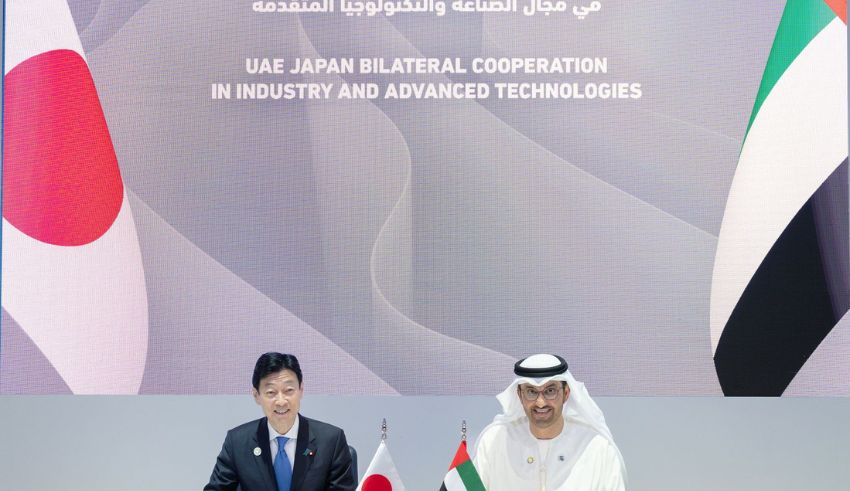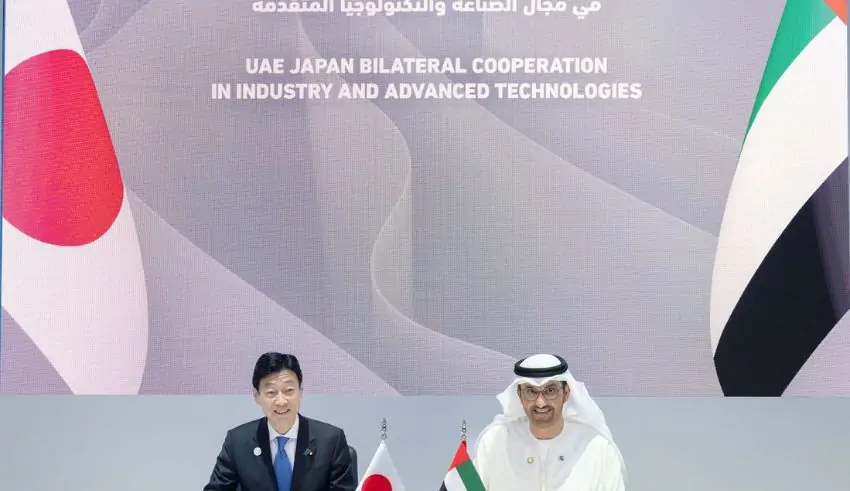

(C) The National
The UAE and Japan have a long-standing and strategic partnership that spans over five decades, covering various fields such as trade, energy, security, culture, and education. The UAE is Japan’s largest trading partner in the Middle East, while Japan is the UAE’s fourth-largest trading partner globally. The UAE is also Japan’s second-largest oil supplier, providing nearly 30% of Japan’s total oil imports.
However, the partnership between the two countries goes beyond the traditional sectors and extends to the new and emerging areas of the future economy, such as advanced technology, renewable energy, artificial intelligence, space, and healthcare. Both countries share a common vision of achieving economic diversification, innovation, and sustainability, and have launched several initiatives and frameworks to enhance their cooperation in these fields.
Some of the notable initiatives and frameworks that aim to boost the role of investment and advanced Japanese technology in supporting the UAE’s development are:
– The Japan-UAE Innovation Partnership (JUIP), which was proposed by Japanese Prime Minister Fumio Kishida during his visit to the UAE in July 2023. The JUIP consists of three pillars: the Japan UAE Coordination scheme for Advanced Technology (JU-CAT), which encourages collaboration between Japanese startups and UAE investors; the Energy Security and Industry Accelerator (ESIA), which fosters comprehensive industrial cooperation in the fields of decarbonization, energy security, and hydrogen, ammonia, and renewable energy; and the Cooperation on the Semiconductor and Battery Industries and Technologies, which aims to enhance the competitiveness and resilience of these strategic sectors.
– The UAE-Japan Business Forum, which was held in Abu Dhabi in July 2023 in the presence of Sheikh Hamed bin Zayed Al Nahyan, Member of the Abu Dhabi Executive Council, and Prime Minister Kishida. The forum witnessed the signing of 23 agreements and memoranda of understanding (MoU) between the two countries in the fields of trade, investment, energy, industry, health, and technology. The agreements and MoUs covered various projects and opportunities, such as the development of a hydrogen economy, the establishment of a joint venture for the production of ammonia, the collaboration in the space sector, the promotion of medical tourism, and the facilitation of trade and investment.
– The UAE-Japan Economic Partnership Agreement (EPA), which was signed in February 2020 and entered into force in April 2020. The EPA is the first comprehensive free trade agreement between Japan and a GCC country, and aims to liberalize and expand trade and investment flows between the two countries. The EPA covers various areas, such as the elimination or reduction of tariffs, the protection of intellectual property rights, the promotion of e-commerce, the enhancement of regulatory cooperation, and the improvement of the business environment.
The investment and advanced Japanese technology have played a vital role in supporting the UAE’s development, especially in the fields of advanced technology, renewable energy, aviation, and healthcare. Some of the benefits and outcomes of the cooperation between the two countries are:
– The creation of new jobs and opportunities for both Emirati and Japanese talents, entrepreneurs, and investors, as well as the transfer of knowledge and skills between the two countries.
– The diversification and modernization of the UAE’s economy, as well as the enhancement of its competitiveness and innovation capabilities in the global market.
– The advancement of the UAE’s vision of becoming a regional and global leader in the fields of renewable energy, artificial intelligence, space, and healthcare, as well as a pioneer in achieving the Sustainable Development Goals (SDGs).
– The strengthening of the UAE’s energy security and resilience, as well as its contribution to the global efforts to combat climate change and reduce greenhouse gas emissions.
– The improvement of the quality of life and well-being of the people of both countries, as well as the promotion of cultural exchange and mutual understanding.
The investment and advanced Japanese technology have received positive feedback and recognition from various stakeholders, including the governments, the private sector, the media, and the public of both countries. The leaders of both countries have expressed their satisfaction and appreciation of the partnership and pledged to continue and deepen their cooperation in the future. The private sector of both countries have also shown their interest and enthusiasm in exploring new avenues and opportunities for collaboration. The media of both countries have also highlighted the achievements and potential of the partnership and its impact on the development of both countries. The public of both countries have also expressed their support and admiration for the partnership and its benefits for both countries.
BLACKPINK's Lisa Declines to Perform at Miss Universe 2025 BLACKPINK's Lisa, who recently stole the limelight at the 2025 Coachella…
Japan's long-standing auto manufacturer Toyota has now officially partnered with Waymo, a U.S. company in the business of self-driving technologies,…
Malaysia Airlines' service expansion to Australia involves the deployment of modern Airbus A330neo aircraft with private business class suites that…
According to state media KCNA, On Wednesday North Korea conducted its first test-firing of the recently displayed “Choe Hyon-class” warship…
Samsung Electronics released a robust set of first-quarter results today, driven by strong smartphone sales particularly with its new Galaxy…
HYCO1 and Malaysia LNG (MLNG) teamed up through a memorandum to establish a revolutionary carbon capture and utilization plant in…
This website uses cookies.
Read More